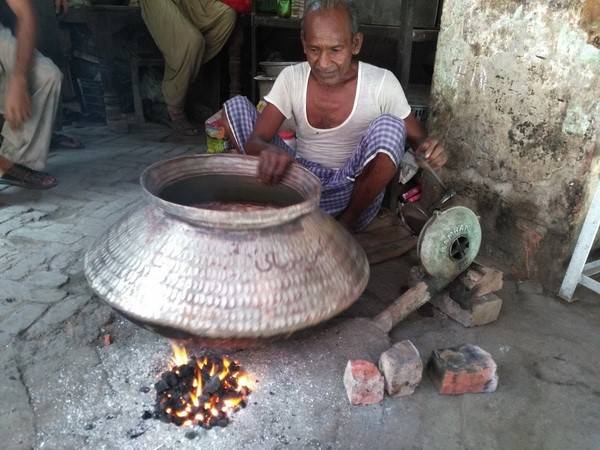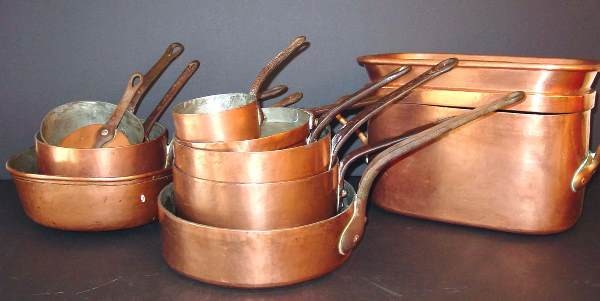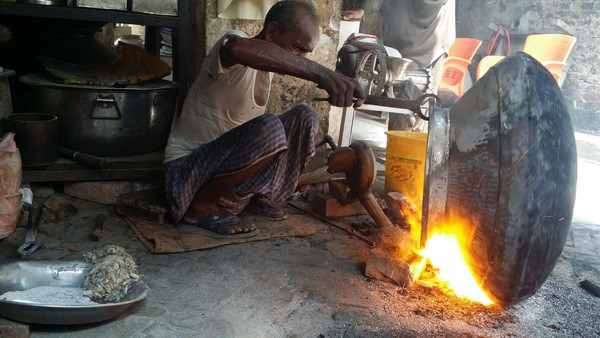
Gone are the days, when people sitting in their homes would hear the familiar voice of a utensil polisher, shouting “Bhandey Qalee Kara Lo, Puraney Nawae Kara Lo” (Get your pots serviced, get the old ones turned new). People used to rush out of their homes carrying copper pots and pans for polishing and the man, who carried a blower made of leather to stoke up a fire, would set up a makeshift arrangement and start his work.
It is a popular belief that utensils made of copper were much better for human health – besides copper is a good conductor of heat and therefore cooking in copper utensils is convenient. Those utensils just needed polishing from time to time so as to keep them corrosion -free. The only disadvantage, of course, is that they start corroding with the passage of time and if they are not polished well in time, the food cooked in these utensils will become hazardous for health.

Modernization has its impact on all spheres of life. Our cookware is no exception. Today, instead of copper, people are using steel and aluminum utensils, which don’t need polishing and therefore the centuries-old custom of utensil-polishing – once a vital household task – is fading away. In Pakistan today, most restaurants, communal kitchens and Pakwan Houses are also using cauldrons made of steel and heavy aluminum instead of the old copper cauldrons – which are very costly.
A few Pakwan Houses, however, still possess and use copper cauldrons. These need polishing from time to time. And that is the niche where Sikandar fits in. He is amongst the very last of the utensil polishers.
Sikandar aka Sikoo took to this profession following the tradition of his forefathers. Since his profession has for the most part died out, Sikoo is in great demand for those who still use the old cauldrons. He has to travel from one city to another to polish copper cauldrons. He regularly polishes cauldrons at the Makhan Pakwan House in Sukkur since the last four decades. Instead of a leather blower, he uses a mechanised blower to stoke the fire and heat the cauldrons before applying the polish. Sitting amidst growling of the manual blower, the hissing sound of fire and stinking smoke of ammonium chloride, Sikoo wears a dhoti and banyan (vest). He sweats profusely as he goes about his business.

“First of all I have to clean the cauldron thoroughly to remove corrosion and heat it properly”, he explains – as he demonstrates precisely that. He makes it revolve continuously with a large pair of pliers. When the cauldron is heated properly, he dabs ammonium chloride with the help of a cotton swab. And then he starts rubbing a metal (commonly tin) on to the pre-heated cauldron. This new layer melts onto the copper.
“This is how we polish the utensils”, Sikoo says, while spreading the molten layer of metal evenly with cotton on a cauldron, which has now turned a bright silver hue. After polishing the outer and upper half of the cauldron, he applies the same metal inside and the cauldron is once again ready for cooking.
Sikoo laments: “Kia bataoon sahib, aaj kal log apni sehat ki parwa nahi karte, bartan jeasa bhi ho paka kar kha lete hain” (What can I tell you? Today people don’t care about their health. They’ll cook in a utensil no matter how it is!”
He most definitely believes that in old times, when people used copper and brass utensils for cooking and eating, they were healthier as compared to today.
“Look at me, I am in my early sixties and have no health issues”, he says while wiping sweat from his face with his dhoti. “My forefathers migrated from India after Partition and since then we are living in Sukkur.” Talking about his grandfather, Sikoo stands up and raising his hand above his head, says with great pride, “My grandfather Karim Bux aka Kareemo was a Badshah Karegar (King in his profession). His polished utensils didn’t need re-polishing for long periods and therefore people preferred to go to him more than any other. Unfortunately I have never been to school, though my parents wanted me to!”
His father’s profession attracted him and he started going with along to help and learn.
“Gradually my father transferred his technique to me and I still remember the first utensil (a cooking pot) that I polished in my neighborhood. While polishing that utensil, I accidentally got my finger burned” he remembers. “After that, I usually accompanied my father and besides learning polishing techniques, I kept on gaining experience and today people use call me Ustad Sikoo” he notes with a broad smile on his sweaty face. “Today, due to an acute shortage of polishers, most of the Pakwan Houses in Southern Punjab and Sindh require my services”
Sikoo explains that without applying ammonium chloride on heated utensils, the polishing metal will not melt and the whole process would fail. As for the endurance of polished utensils when correctly done, he says it depends upon the use. Normally a good polish lasts for more than two months or so. In some cases, it can last longer.
Haji Faisal, owner of a Pakwan House in Sukkur, strongly advocates using copper cauldrons, because it is good for health. A committed traditionalist in this matter, he believes that modern steel and aluminum pots and pans are hazardous to health.
“Many Pakwan Houses in Sukkur and other cities have switched to steel cauldrons, because utensil polishers are not available easily. Sikoo is polishing our cauldrons for more than 40 years now. Every time he visits our Pakwan House, he polishes 20 t0 30 cauldrons in two to three days. People have stopped using the old copper pots because they are very costly and need polishing from time to time. A normal-sized copper cauldron costs around Rs.60,000 while a steel cauldron bigger than that costs just half that amount –and requires only proper cleaning.”
The supposed health benefits of using copper utensils may actually exist or they might simply be an old-world folk belief. But another case is also made for using these older utensils. Munna, another Pakwan House owner, shares his experience. For him, the taste of food cooked in copper cauldrons is much better than that cooked in steel or aluminum cauldron.
“Besides,” he says, “it takes less time cooking – and thus saves both time and energy. The only problem we are facing with using our old-style cauldrons is the acute shortage of cookware polishers. Otherwise copper cookware is, quite simply, the best!”
It is a popular belief that utensils made of copper were much better for human health – besides copper is a good conductor of heat and therefore cooking in copper utensils is convenient. Those utensils just needed polishing from time to time so as to keep them corrosion -free. The only disadvantage, of course, is that they start corroding with the passage of time and if they are not polished well in time, the food cooked in these utensils will become hazardous for health.

Sikoo believes that in old times, when people used copper and brass utensils for cooking and eating, they were healthier as compared to today
Modernization has its impact on all spheres of life. Our cookware is no exception. Today, instead of copper, people are using steel and aluminum utensils, which don’t need polishing and therefore the centuries-old custom of utensil-polishing – once a vital household task – is fading away. In Pakistan today, most restaurants, communal kitchens and Pakwan Houses are also using cauldrons made of steel and heavy aluminum instead of the old copper cauldrons – which are very costly.
A few Pakwan Houses, however, still possess and use copper cauldrons. These need polishing from time to time. And that is the niche where Sikandar fits in. He is amongst the very last of the utensil polishers.
Sikandar aka Sikoo took to this profession following the tradition of his forefathers. Since his profession has for the most part died out, Sikoo is in great demand for those who still use the old cauldrons. He has to travel from one city to another to polish copper cauldrons. He regularly polishes cauldrons at the Makhan Pakwan House in Sukkur since the last four decades. Instead of a leather blower, he uses a mechanised blower to stoke the fire and heat the cauldrons before applying the polish. Sitting amidst growling of the manual blower, the hissing sound of fire and stinking smoke of ammonium chloride, Sikoo wears a dhoti and banyan (vest). He sweats profusely as he goes about his business.

“First of all I have to clean the cauldron thoroughly to remove corrosion and heat it properly”, he explains – as he demonstrates precisely that. He makes it revolve continuously with a large pair of pliers. When the cauldron is heated properly, he dabs ammonium chloride with the help of a cotton swab. And then he starts rubbing a metal (commonly tin) on to the pre-heated cauldron. This new layer melts onto the copper.
“This is how we polish the utensils”, Sikoo says, while spreading the molten layer of metal evenly with cotton on a cauldron, which has now turned a bright silver hue. After polishing the outer and upper half of the cauldron, he applies the same metal inside and the cauldron is once again ready for cooking.
Sikoo laments: “Kia bataoon sahib, aaj kal log apni sehat ki parwa nahi karte, bartan jeasa bhi ho paka kar kha lete hain” (What can I tell you? Today people don’t care about their health. They’ll cook in a utensil no matter how it is!”
He most definitely believes that in old times, when people used copper and brass utensils for cooking and eating, they were healthier as compared to today.
“Look at me, I am in my early sixties and have no health issues”, he says while wiping sweat from his face with his dhoti. “My forefathers migrated from India after Partition and since then we are living in Sukkur.” Talking about his grandfather, Sikoo stands up and raising his hand above his head, says with great pride, “My grandfather Karim Bux aka Kareemo was a Badshah Karegar (King in his profession). His polished utensils didn’t need re-polishing for long periods and therefore people preferred to go to him more than any other. Unfortunately I have never been to school, though my parents wanted me to!”
His father’s profession attracted him and he started going with along to help and learn.
“Gradually my father transferred his technique to me and I still remember the first utensil (a cooking pot) that I polished in my neighborhood. While polishing that utensil, I accidentally got my finger burned” he remembers. “After that, I usually accompanied my father and besides learning polishing techniques, I kept on gaining experience and today people use call me Ustad Sikoo” he notes with a broad smile on his sweaty face. “Today, due to an acute shortage of polishers, most of the Pakwan Houses in Southern Punjab and Sindh require my services”
Sikoo explains that without applying ammonium chloride on heated utensils, the polishing metal will not melt and the whole process would fail. As for the endurance of polished utensils when correctly done, he says it depends upon the use. Normally a good polish lasts for more than two months or so. In some cases, it can last longer.
Haji Faisal, owner of a Pakwan House in Sukkur, strongly advocates using copper cauldrons, because it is good for health. A committed traditionalist in this matter, he believes that modern steel and aluminum pots and pans are hazardous to health.
“Many Pakwan Houses in Sukkur and other cities have switched to steel cauldrons, because utensil polishers are not available easily. Sikoo is polishing our cauldrons for more than 40 years now. Every time he visits our Pakwan House, he polishes 20 t0 30 cauldrons in two to three days. People have stopped using the old copper pots because they are very costly and need polishing from time to time. A normal-sized copper cauldron costs around Rs.60,000 while a steel cauldron bigger than that costs just half that amount –and requires only proper cleaning.”
The supposed health benefits of using copper utensils may actually exist or they might simply be an old-world folk belief. But another case is also made for using these older utensils. Munna, another Pakwan House owner, shares his experience. For him, the taste of food cooked in copper cauldrons is much better than that cooked in steel or aluminum cauldron.
“Besides,” he says, “it takes less time cooking – and thus saves both time and energy. The only problem we are facing with using our old-style cauldrons is the acute shortage of cookware polishers. Otherwise copper cookware is, quite simply, the best!”

